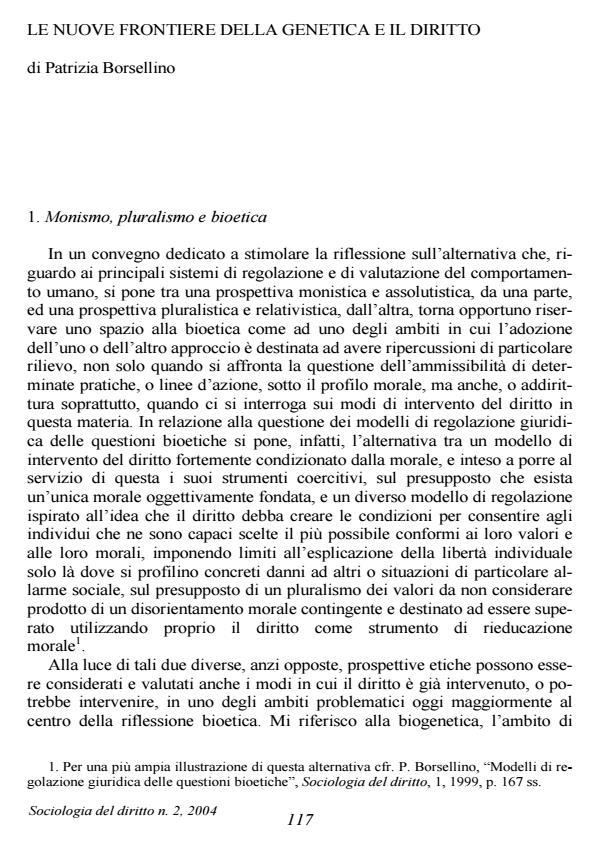La nuove frontiere della genetica e il diritto
Titolo Rivista SOCIOLOGIA DEL DIRITTO
Autori/Curatori Patrizia Borsellino
Anno di pubblicazione 2004 Fascicolo 2004/2 Lingua Italiano
Numero pagine 14 P. Dimensione file 59 KB
DOI
Il DOI è il codice a barre della proprietà intellettuale: per saperne di più
clicca qui
Qui sotto puoi vedere in anteprima la prima pagina di questo articolo.
Se questo articolo ti interessa, lo puoi acquistare (e scaricare in formato pdf) seguendo le facili indicazioni per acquistare il download credit. Acquista Download Credits per scaricare questo Articolo in formato PDF

FrancoAngeli è membro della Publishers International Linking Association, Inc (PILA)associazione indipendente e non profit per facilitare (attraverso i servizi tecnologici implementati da CrossRef.org) l’accesso degli studiosi ai contenuti digitali nelle pubblicazioni professionali e scientifiche
What are the premises that genetics is capable of maintaining? What threats deriving against which defences need to be constructed, making use of legal tools, among other things? By clarifying the practical fallout deriving from the knowledge acquired in the field of genetics in recent years, in particular the human genome mapping project, the author highlights how genetics offers authority neither to postulate that all diseases may be vanquished within a handful of years, nor to fear that there is a concrete risk of living in a society of genetically manipulated human beings. There is rather a risk deriving from the availability of a large amount of genetic information, related to the diffusion of increasingly accessible tests that ascertain an individual’s genetic predisposition to develop a given illness or certain behavioural features. Discriminatory policies have in fact already been put into place in some cases especially in the areas of insurance and employment on the weak foundations of the statistical probabilities of genetic profiles calculated on the basis of predictive tests. Moreover, a new lease of life has been acquired by the deterministic conception already used towards the end of the nineteenth century by the Positive Criminal School to justify the preventive restriction of personal freedom. After stressing that every intervention of lawmaking with regard to genetic information implies the need to make critical value judgements, the author highlights the fact and adds her own positive appraisal that the interventions of lawmaking in this field on both national and international level for which information is available have identified individual freedom as the priority value deserving of suitable legal safeguards, thus supporting the pluralist ethical perspective that has no room for any form of subordination of individuals and their choices to any claims of supposed moral superiority, not even of a social moral centred on the public weal and social defence.;
Patrizia Borsellino, La nuove frontiere della genetica e il diritto in "SOCIOLOGIA DEL DIRITTO " 2/2004, pp , DOI: